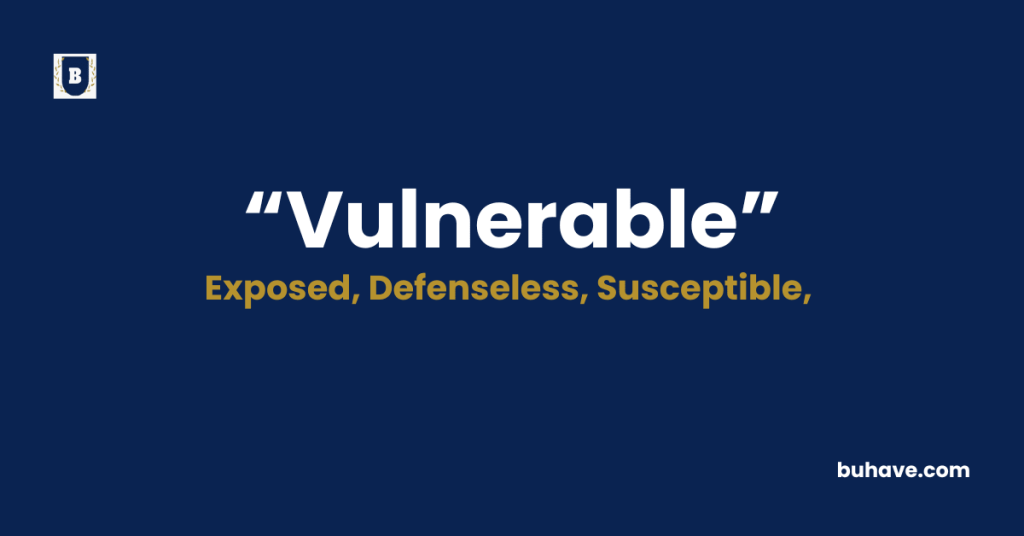The word Vulnerable (adjective) describes a state of being exposed to the possibility of harm, danger, or emotional hurt. In this guide, you’ll learn the full definition, synonyms, antonyms, etymology, and real-life examples of how to use Vulnerable correctly in sentences.
Vulnerable Explained in Depth
A complete and detailed guide to the word Vulnerable including meaning, definition, examples, etymology, synonyms, and antonyms.
Meanings of Vulnerable
Vulnerable means being open to harm or attack, either physically, emotionally, or psychologically. It reflects a condition where one lacks protection or defense and is therefore susceptible to injury or influence. Vulnerability can relate to health, emotions, social conditions, or security.
Definition
Vulnerable refers to the quality of being susceptible to harm, weakness, or emotional exposure. It describes a state in which a person, system, or situation lacks the protection or resilience needed to guard against threats or damage. This term is often used in emotional contexts, such as when someone is honest about their feelings and risks being hurt. It also appears in healthcare to describe individuals with increased risk due to age or illness, and in technology to indicate security gaps. While being vulnerable is often perceived as a weakness,
it can also be a strength, particularly in relationships, where openness can lead to trust and connection. Recognizing one’s vulnerability can foster deeper understanding, compassion, and personal growth.
Etymology
The word vulnerable comes from the Latin root vulnerabilis, meaning “wounding” or “to wound,” from the verb vulnerare (“to wound”) and the noun vulnus (“wound”). First appearing in English in the early 17th century, it originally referred to physical wounds. Over time, the meaning expanded to include emotional and social contexts, especially in psychology and interpersonal relationships. In modern usage, vulnerability has taken on a more complex meaning—not only highlighting exposure to harm, but also representing courage, authenticity, and human connection. The evolution of the word reflects a shift in societal values toward accepting openness and emotional honesty as strengths rather than flaws.
Example Sentences
- She felt vulnerable sharing her true feelings for the first time.
- The system’s outdated software made it vulnerable to cyberattacks.
Vulnerable Synonyms
- Exposed
- Susceptible
- Unprotected
- Defenseless
- Weak
- Open
- Sensitive
- Fragile
- Unsecured
- At risk
Vulnerable Antonyms
- Protected
- Secure
- Strong
- Resilient
- Safe
- Invulnerable
- Shielded
- Defended
- Stable
- Armored
FAQs about Vulnerable
Here are some frequently asked questions (FAQs) about the word “Vulnerable”
1. What does it mean to be emotionally vulnerable?
It means being open about your feelings, fears, or needs, which can leave you at risk of emotional hurt but also deepen relationships.
2. Is being vulnerable a weakness?
No. While it can involve risk, vulnerability is also a sign of strength, honesty, and emotional maturity.
3. In what contexts is the word “vulnerable” used?
It’s used in emotional, physical, social, health, cybersecurity, and legal contexts to describe susceptibility to harm or threat.
4. Can vulnerable be a positive trait?
Yes. In relationships and leadership, vulnerability encourages trust, empathy, and authenticity.
5. How do you protect vulnerable people in society?
By ensuring equal access to resources, healthcare, safety measures, and emotional support systems.

















